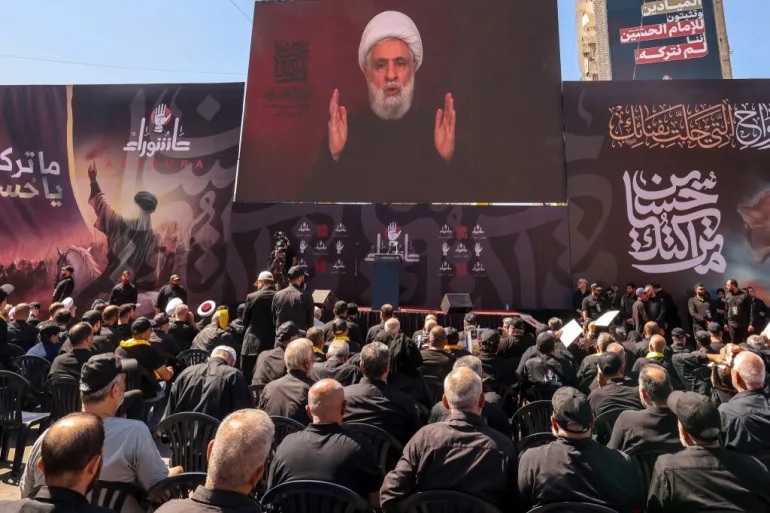Hezbollah’s leadership has reiterated its refusal to lay down arms or ease its resistance against Israel until there is a complete end to Israeli air strikes and military presence in southern Lebanon.
Speaking to thousands of followers gathered in Beirut’s southern suburbs on Sunday, July 6, 2025, during Ashura, Hezbollah’s deputy leader Naim Qassem said peace could only be discussed after clear signs of Israeli de-escalation.
“We cannot be asked to compromise or disarm while Israeli aggression persists,” Qassem declared during the annual Shia Muslim commemoration.
It is a day that supposedly symbolized resistance and martyrdom.
Ashura honors the death of Imam Hussein, the grandson of the Prophet Muhammad, who was killed in the Battle of Karbala in 680 AD.
This was after refusing allegiance to the ruling Umayyad caliphate.
For Shia Muslims, the occasion represents a stand against oppression and injustice, principles Hezbollah says guide its ongoing struggle.
The southern suburbs of Beirut, a well-known Hezbollah stronghold, were filled with yellow flags.
There were also chants of defiance as Qassem spoke beneath images of former leader Hassan Nasrallah, who was assassinated by Israel in September 2024.
His death followed Israel’s intensified military campaign against Lebanon, which began on October 8, 2023.
This was just one day after the Palestinian group Hamas launched a deadly incursion into Israeli territory that left about 1,100 people dead and 250 taken hostage.
In response, Israel launched a devastating bombing campaign on Gaza that has since claimed over 57,000 Palestinian lives, mostly women and children.
The assault was compounded by a harsh blockade that cut off access to essential food and medical supplies, pushing Gaza’s 2.3 million residents to the edge of famine.
Simultaneously, Israel opened another front in Lebanon, escalating tensions into full-scale war by September 2024.
That conflict killed over 4,000 people, displaced nearly 1.4 million, and severely weakened Hezbollah’s leadership structure.
Though a ceasefire brokered by the United States in November officially paused large-scale hostilities, Israel has continued low-intensity operations, air strikes and ground incursions, across Lebanon’s southern border.
According to Lebanon’s Ministry of Health, Israeli attacks since the ceasefire have killed approximately 250 people and injured more than 600.
Qassem, in his address, directly condemned these ongoing violations.
“How can we be expected to stand down while Israel occupies our land, invades our territory, and kills our people?” he asked.
Hezbollah insists that disarmament is off the table unless specific conditions are met.
The conditions include:
- full Israeli withdrawal from five key border zones,
- cessation of all aggression,
- the release of Lebanese prisoners, and,
- the launch of reconstruction efforts in war-torn areas.
Only then, Qassem said, would Hezbollah consider entering discussions about a national defense framework and broader security strategy.
His speech also rejected the idea of normalization with Israel, countering recent remarks by Israeli Foreign Minister Gideon Saar, who expressed interest in improved ties with Lebanon.
“We refuse to legitimize the occupation, whether in Lebanon or anywhere in the region,” Qassem stated.
His comment signals that the group remains resolute in its broader anti-Israel stance.
Tensions flared again just a day before the speech, when Israeli drones launched four strikes on towns in southern Lebanon.
One person was killed and several others wounded, according to local reports.
While most attacks have been concentrated near the border, Israeli jets have also struck Beirut’s southern districts, dense, populated areas that house thousands.
These strikes have triggered panic, leading to large-scale evacuations.
Qassem’s remarks came ahead of a planned visit to Beirut by U.S. envoy Tom Barrack, who is currently assigned to diplomatic affairs in Turkiye and Syria.
Lebanese officials revealed that the U.S. has pushed for Hezbollah’s disarmament by the end of the year.
Meanwhile, Israel has issued threats of continued strikes unless the group is disarmed.
Lebanon’s President Joseph Aoun, however, has voiced concern over these demands.
He emphasized that the issue of Hezbollah’s arms is “complex and sensitive,” and that unilateral pressure could further destabilize the country.
Aoun has urged the U.S. and its allies to focus instead on halting Israeli aggression and encouraging diplomacy.







